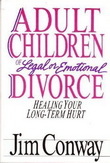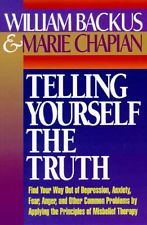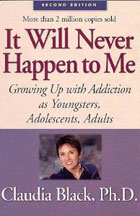

Dysfunctional Family Roles
Role - is a way of behavior, inherent to children from dysfunctional families. This behavior is easy to recognize and see.
These roles are shaped when unsafe to life or health situations happen. For example, when a drunk father came and the story repeats: everyone is trying to please him to calm him down so that he
would not be nervous and abusive. Children often play a major role in this case. They take responsibility
for peace in the family, while their mother could stop it all, but, not knowing that, she allows
children to do it.. again and again..
There are four basic roles that children adopt in order to survive
growing up in emotionally dishonest, shame-based,
controlling,
dysfunctional family systems. Some children maintain one role into adulthood while
others switch from one role to another as the family dynamic changes (i.e. when the oldest leaves home, etc.)
An only child may play all of the roles at one time or another.
| Dysfunctional Family Role |
What's on the outside |
What you don't see |
What they do for the family and why they play along |
Without help this is very possible |
What is possible with help |
| Hero |
Perfect, can't be wrong, gets positive attention, awards, degrees |
Fear of Failing, over-controlled |
Family feels we are not so bad, because this person is so good. The Hero likes the extra power and attention |
Workaholic, Physical Illness, Controlling, Not much fun. Prideful, Shameless |
Achievement oriented vs. Success.
Has learned to say no and not be so perfect, can get in touch with the "bad" stuff |
|
Child-hero in the family of aggressor or alcoholic stands up for his family and mother, although it is not safe for him. In addition, this child begins to take responsibility for the decisions in the family as the father should do.
Not being able to rely on her husband, mother accepts the child's role of a "hero".
As an adult, "hero" can have the mindset that he needs to be responsible for everybody and everything. He can exhaust himself with activities and be blind to his real personal needs.
|
| Dysfunctional Family Role |
What's on the outside |
What you don't see |
Why they play along |
Without help this is possible |
With help this is possible |
| Scapegoat |
"Bad", angry, impulsive, never good enough, "Black Sheep" of family, Doesn't fit in |
Hurt, rejection, full of shame, feels like a loser |
Marriage is brought together to "fix" the scapegoat. Hero feels "good" because scapegoat is "bad". We can avoid our "bad" stuff by downloading it onto the scapegoat |
Addictive, trouble with law, promiscuous, "chip on shoulder", continuing to play the role in jobs and future relationships, constantly in trouble |
Can learn to be good and feel good, learns to take appropriate risks, business owners, missionary types |
|
Scapegoat - in a family the child unconsciously "attracts" father's aggression, distracting him from other relatives.
He makes mistakes and hurts himself without understanding. Very often it ends with severe punishment - this is a terrible role. Label "moron"
in adult life will be a constant companion of such a man. Consequence - the formation of an even greater sense of guilt,
hatred and resentment towards himself and others. Kind soul is hidden behind this mask, but this is not known to him or to the others. |
| Dysfunctional Family Role |
What's on the outside |
What you don't see |
Why they play along |
Without help this is possible |
With help this is possible |
| Lost Child |
Ignored, quiet, invisible, loves animals, material possessions, artistic, sometimes has learning disabilities |
Frozen feelings, can't express feelings, lonely |
The family feels, "at least we don't have to worry about this kid" |
Doesn't share opinions, doesn't feel needed — can die early because of this |
Talented and creative, can learn to participate and share wisdom that they achieve by being quieter, good listeners, feels needed and connected with time |
|
The destructiveness of "Lost Child" role is in one's inner world isolation.
Expectation of father coming home drunk and what happens next leads child to horror.
He thinks, "If I will be quiet, my dad will not be angry..".
Traits like withdrawal and indecisiveness accompany the person for life.
In a similar way he will respond in unsafe situations.
Such people find it hard to trust someone and to go on contact.
The result is lack of understanding from those around them, even more self-disrespect, fear and isolation.
|
| Dysfunctional Family Role |
What's on the outside |
What you don't see |
Why they play along |
Without help this is possible |
With help this is possible |
| Clown or Mascot |
Funny, hysterical, anything for a laugh, cute, immature |
Hides pain with humor, scared, feels inadequate |
They bring comic relief to the family. Helps the family avoid issues |
Continues to build up pain, lets others tell them what to do too much, too much of a follower, never grows up |
Can feel range of emotion, can use laughter in good ways, learns to take the lead more, grows up into more responsibility |
|
The child has to come up with all sorts of jokes and folly,
to distract everyone from the real issues. First, in his childhood, it looks fine, but try to remember
someone you know. In adult life, this clown is more than ridiculous. This person can make silly gestures
exhibit strange facial expressions, insert jokes off topic. He just does not know how to react. Mockery, misunderstanding,
strange glances accompany such people in their adult life. What is the life of such people? They are hard to be taken seriously and often have problems with personal life.
|
With time Hero and Scapegoat can switch their roles. You can have two Heroes if
the family has a significant age gap between two children. It can also happen when the first two children are a boy hero and a girl hero. The healthier the family, the less these roles are attached. The more dysfunctional, the more complicated it is to get out of these roles. One needs to analyze ones own behavior, thoughts and feelings as part of the role, it will be the first step to changes.
We must remember that all these roles mask the true self of a person.
The real personality will come out when a person get rid of these masks. These roles
can't help to achieve anything, they will only cause confusion and problems in dealing with people.
But adult children, not knowing this, interact using the same patterns over and over again.
For extra information on this topic - see
dysfunctional family roles by Dan Hitz.
|



